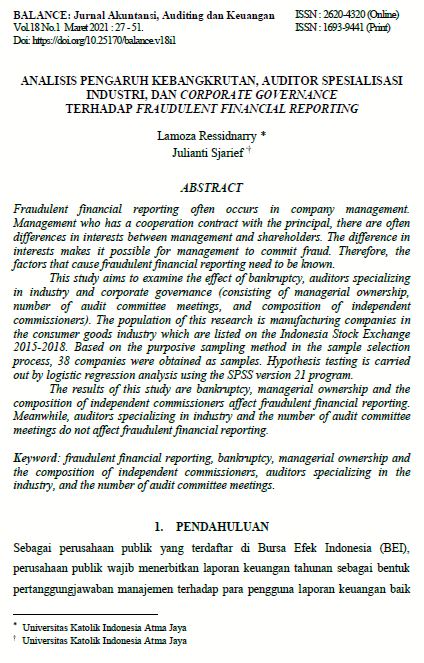ANALISIS PENGARUH KEBANGKRUTAN, AUDITOR SPESIALISASI INDUSTRI DAN CORPORATE GOVERNANCE TERHADAP FRAUDULENT FINANCIAL REPORTING
DOI:
https://doi.org/10.25170/balance.v18i1.2297Keywords:
fraudulent financial reporting, bankruptcy, managerial ownership and the composition of independent commissioners, auditors specializing in the industry, and the number of audit committee meetingsAbstract
Fraudulent financial reporting often occurs in company management. Management who has a cooperation contract with the principal, there are often differences in interests between management and shareholders. The difference in interests makes it possible for management to commit fraud. Therefore, the factors that cause fraudulent financial reporting need to be known.
This study aims to examine the effect of bankruptcy, auditors specializing in industry and corporate governance (consisting of managerial ownership, number of audit committee meetings and composition of independent commissioners). The population of this research is manufacturing companies in the consumer goods industry which are listed on the Indonesia Stock Exchange 2015-2018. Based on the purposive sampling method in the sample selection process, 38 companies were obtained as samples. Hypothesis testing is carried out by logistic regression analysis using the SPSS version 21 program.
The results of this study are bankruptcy, managerial ownership and the composition of independent commissioners have an effect on fraudulent financial reporting. Meanwhile, auditors specializing in industry and the number of audit committee meetings have no effect on fraudulent financial reporting.
References
Aniqotunnafiah, S. & Masruri, (2019). The Composition of Independent Board of Commissioner and Number of Board of Commissioner Meeting towards Fraudulent of Financial Report (Empirical Study at Public Company Listed at Indonesia Stock Exchage in 2011-2017). International Journal of Financial Research, 10(4), 96-107.
Arens, A.A., Elder, R.J., Beasley, M.S. (2012). Auditing and Assurance Service: An Integrate Approach (14th Ed). England: Person Education Limited. Association of Certified Fraud Examiners (ACFE). (2020). Report to the Nation on Occupational Fraud Abuse.
Bryan, D., Troy, J., Samuel, L.T. (2014). The Role that Fraud has on Bankruptcy and Bankruptcy Emergence. Journal of Forensie & Investigative Accounting, 6 (2), 126-156.
Bhavani, G & Amponsah, C.T. (2017). M-Score and Z-Score For Detection of Accountung Fraud. Accountancy Business and the Public Interest, 1(1), 68-86.
Carcello, J.V., & Nagy, A,L. (2004). Client Size, Auditor Specialization and Fraudulent Financial Reporting. Managerial Auditing Journal, 19(5), 651-668.
Ferdinand, R., & Santosa, S. (2018). Factors that Influence Fraudulent Financial Statements in Retail Companies – Indonesia. Journal of Applied Accounting and Finance, 2(2), 99-109.
IICG. (2011). Indonesian Institute Corporate Governance. Jakarta.
Imanta, D., & Satwiko, R. (2011). Faktor-faktor yang Mempengaruhi Kepemilikan Manajerial. Jurnal Bisnis dan Akuntansi, 1(13), 67-80.
Kartikasari, R.N., & Irianto, G. (2010). Penerapan Model Beneish (1999) dan Model Altman (2000) dalam Mendeteksi Kecurangan Laporan Keuangan. Jurnal Akuntansi Multiparadigma, 1(2), 323-340.
Lenard, M.J., & Alam, P. (2009). An Historical Prespective on Fraud Detection: From Bankruptcy Models to Most Effective Indicators of Fraud in Recent Indicates. Journal of Forensic & Investigative Accounting, 1(1), 1-27.
Mukhlasin, M. (2018). Auditor Tenure and Auditor Industry Specialization as a Signal to Detect Fraudulent Financial Reporting. Academy of Accounting and Finance Studies Jurnal, 22(5), 1-10.
Nurliasari, K.E., & Achmad, T. (2020). Pengaruh Karakteristik Komite Audit terhadap Kecurangan Pelaporan Keuangan. Diponegoro Journal of Accounting. 9(1), 1-12.
POJK Nomor 33 Tahun 2014. (2014). Peraturan Otoritas Jasa Keuangan No. 33 Tahun 2014 tentang Direksi dan Dewan Komisaris Emiten atau Perusahaan Publik. Jakarta: Otoritas Jasa Keuangan. POJK Nomor 55 Tahun 2015. (2015) Peratutan Otoritas Jasa Keuangan No. 55 tentang Pembentukan dan Pedoman Pelaksanaan Kerja Komite Audit. Jakarta: Otoritas Jasa Keuangan.
Prasetyo, A.B. (2014). Pengaruh Karakteristik Komite Audit dan Perusahaan terhadap Kecurangan Pelaporan Keuangan (Studi Empiris pada Perusahaan yang Listed di Bursa Efek Indonesia Periode 2006-2010). Jurnal Akuntansi & Auditing. 11(1), 1-24.
Priswita, F., & Taqwa, S. (2019). Pengaruh Corporate Governance terhadap Kecurangan Laporan Keuangan Studi Empiris pada Perusahaan Manufaktur yang Terdaftar di Bursa Efek Indonesia Tahun 2015-2017. Jurnal Eksplorasi Akuntansi, 1(4), 1705-1722.
PSAK 1 (2015). Pernyataan Standar Akuntansi Keuangan 1 Tahun 2015 tentang Penyajian Laporan Keuangan. Jakarta: Ikatan Akuntansi Indonesia.
Safiq, M., & Seles, W. (2018). The Effects of External Pressures, Financial Targets and Financial Distress on Financial Statement Fraud. Advances in Economics, Business and Management Research, 73, 57-61.
Sari, T, P., & Novasari, L, N. (2019). Pengaruh Auditor Spesialisasi Industri dan Redflags terhadap Kualitas Laba pada Perusahaan Publik di Bidang Keuangan. Jurnal Ilmiah Universitas Semarang, 17(1), 147-168.
Skousen, C.J. (2008). Detecting and Predicting Financial Statement Fraud: The Effectiveness of the Fraud Traingle and SAS No. 99. Retrieved July 23, 2020, http://ssrn.com/abstract=1295494.
Wicaksono, G.S., & Chariri, A. (2015). Mekanisme Corporate Governance dan Kemungkinan Kecurangan dalam Laporan Keuangan. Diponegoro Journal of Accounting, 4(1), 552-563.



